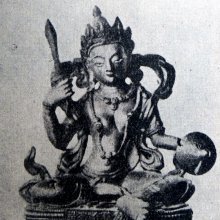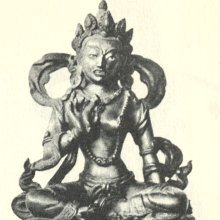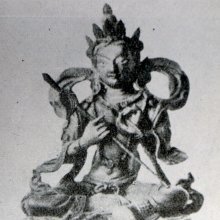Dashami, Daśamī: 9 definitions
Introduction:
Dashami means something in Hinduism, Sanskrit, Marathi, Hindi. If you want to know the exact meaning, history, etymology or English translation of this term then check out the descriptions on this page. Add your comment or reference to a book if you want to contribute to this summary article.
The Sanskrit term Daśamī can be transliterated into English as Dasami or Dashami, using the IAST transliteration scheme (?).
Images (photo gallery)
In Hinduism
Vaishnavism (Vaishava dharma)
Source: Devotees Vaishnavas: Śrī Garga SaṃhitāDaśamī (दशमी).—According to the Garga-saṃhitā 4.8.26-27, “ When ekādaśī is ended, and the daśamī day has come, one should avoid these ten things: 1. eating from a brass dish, 2. eating flesh, 3. masūra dāl, 4. kodrava grains, 5. chick-peas, 6. spinach, 7. honey, 8. and the food of others, 9. eating twice, and 10. sex. One should also avoid gambling, playing, sleeping, chewing betelnuts, and brushing the teeth.”
Source: Pure Bhakti: Arcana-dipika - 3rd EditionDaśamī (दशमी) refers to one of the various “lunar days” (tithi):—There are approximately 29.5 lunar days in a lunar month. The first fifteen days begin with the first phase of the waxing moon (pratipat) and end with the full moon (pūrṇimā). [...] In accordance with the lunar day, one would utter, [for example, daśamī-tithau].

Vaishnava (वैष्णव, vaiṣṇava) or vaishnavism (vaiṣṇavism) represents a tradition of Hinduism worshipping Vishnu as the supreme Lord. Similar to the Shaktism and Shaivism traditions, Vaishnavism also developed as an individual movement, famous for its exposition of the dashavatara (‘ten avatars of Vishnu’).
Kavya (poetry)
Source: archive.org: Naisadhacarita of SriharsaDaśamī (दशमी) or Daśamin means “very old”.—Cf. Daśamitā, which refers to “extreme old age” or “decline”, and is mentioned in the Naiṣadha-carita 19.1.

Kavya (काव्य, kavya) refers to Sanskrit poetry, a popular ancient Indian tradition of literature. There have been many Sanskrit poets over the ages, hailing from ancient India and beyond. This topic includes mahakavya, or ‘epic poetry’ and natya, or ‘dramatic poetry’.
Languages of India and abroad
Marathi-English dictionary
Source: DDSA: The Molesworth Marathi and English Dictionarydaśamī (दशमी).—f (S) The tenth lunar day. 2 A sort of cake made with milk or fruit-juice instead of water; viz. food which a person, although ōṃva- ḷā, is permitted to eat. See, if curious, ōṃvaḷā & sōṃvaḷā. 3 (or daśamī daśā f) The tenth or last stage of human life.
Source: DDSA: The Aryabhusan school dictionary, Marathi-Englishdaśamī (दशमी).—f The 10th lunar day. A sort of cake.
Marathi is an Indo-European language having over 70 million native speakers people in (predominantly) Maharashtra India. Marathi, like many other Indo-Aryan languages, evolved from early forms of Prakrit, which itself is a subset of Sanskrit, one of the most ancient languages of the world.
Sanskrit dictionary
Source: DDSA: The practical Sanskrit-English dictionaryDaśamī (दशमी).—
1) The tenth day of a lunar fortnight.
2) The tenth decade of the human life; यत्र स्युः सोऽत्र मानार्हः शूद्रोऽपि दशमीं गतः (yatra syuḥ so'tra mānārhaḥ śūdro'pi daśamīṃ gataḥ) Manusmṛti 2.137.
3) The last ten years of a century.
Source: Cologne Digital Sanskrit Dictionaries: Monier-Williams Sanskrit-English Dictionary1) Daśamī (दशमी):—[from daśama > daśa] f. the 10th stage of human life (age from 91 to 100 years), [Atharva-veda iii, 4; Tāṇḍya-brāhmaṇa; Gautama-dharma-śāstra; Manu-smṛti ii]
2) [v.s. ...] ([scilicet] tithi) the 10th day of the half moon, [iii, 276; Mahābhārata] etc.
3) [v.s. ...] the 10th day after birth, [Patañjali [Introduction] 73]
Sanskrit, also spelled संस्कृतम् (saṃskṛtam), is an ancient language of India commonly seen as the grandmother of the Indo-European language family (even English!). Closely allied with Prakrit and Pali, Sanskrit is more exhaustive in both grammar and terms and has the most extensive collection of literature in the world, greatly surpassing its sister-languages Greek and Latin.
Hindi dictionary
Source: DDSA: A practical Hindi-English dictionaryDaśamī (दशमी):—(nf) the tenth day of each lunar fortnight.
...
Kannada-English dictionary
Source: Alar: Kannada-English corpusDaśami (ದಶಮಿ):—
1) [noun] the tenth day following a new moon-day or full moon-day.
2) [noun] the period between the beginning of 91st year and the end of 100th year in the life of a person.
--- OR ---
Daśami (ದಶಮಿ):—[noun] a kind of dry, flat cake made of the flour of jowar, wheat etc, mixed with milk.
Kannada is a Dravidian language (as opposed to the Indo-European language family) mainly spoken in the southwestern region of India.
See also (Relevant definitions)
Starts with: Dasamika, Dashamidashamimgata, Dashamin, Dashamingata, Dashamistha, Dashamita, Dashamivedha.
Ends with: Ashadashami, Ashadhadashami, Jambhali-dashami, Khupasadashami, Vijayadashami.
Full-text (+20): Dashamistha, Vijayadashami, Dashamin, Dashavi, Vijayadashaminirnaya, Abhisheka, Dasave, Dasime, Dashamingata, Mayuratirtha, Khupasadashami, Narayaneshvara, Krishnatirtha, Yajnahgangatirtha, Jambhali-dashami, Gopaleshvara, Kuteshvara, Jnaneshvara, Galavatirtha, Ativedha.
Relevant text
Search found 32 books and stories containing Dashami, Daśamī, Dasami, Daśami; (plurals include: Dashamis, Daśamīs, Dasamis, Daśamis). You can also click to the full overview containing English textual excerpts. Below are direct links for the most relevant articles:
Manusmriti with the Commentary of Medhatithi (by Ganganatha Jha)
Verse 2.137 < [Section XXIV - Degrees of Respect]
Verse 2.90 < [Section XVIII - Control of Sensual Desires]
Garga Samhita (English) (by Danavir Goswami)
Verses 4.8.26-27 < [Chapter 8 - In the Story of the Yajña-sītās, the Glories of Ekādaśī]
Verses 3.10.31-37 < [Chapter 10 - The Glory of Śrī Girirāja]
Verse 4.8.33 < [Chapter 8 - In the Story of the Yajña-sītās, the Glories of Ekādaśī]
The Indian Buddhist Iconography (by Benoytosh Bhattachacharyya)
Temples of Munnur (Historical Study) (by R. Muthuraman)
Vijayadasami < [Chapter 6]
The Skanda Purana (by G. V. Tagare)
Chapter 11 - The Story of Ekādaśī < [Section 5 - Mārgaśīrṣa-māhātmya]
Chapter 12 - Uninterrupted Ekādaśī Vow < [Section 5 - Mārgaśīrṣa-māhātmya]
Chapter 219 - Kāmya Śrāddha < [Section 1 - Tīrtha-māhātmya]



